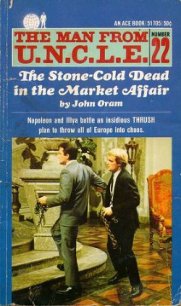[Magazine 1966-12] - The Goliath Affair - Jakes John (чтение книг TXT) 📗
"Incredible," was Mr. Waverly's comment.
"I'd say impossible," Solo spoke, "except that Illya and I saw it happen."
"I cannot believe that a human fist could do such damage, Mr. Solo."
"No, sir, not my fist, or yours. But Klaanger's did."
"Such a thing is simply not to be countenanced!" Mr. Waverly gestured rather melodramatically, as if trying to convince himself.
There was no escaping the depressing possibility that the dreaded organization against which U.N.C.L.E. had fought had once again discovered a way to twist and warp the laws of nature to serve its own malevolent ends.
Mr. Waverly walked to the window. He ticked his pipe stem against the sill and gazed out at the light-spangled panorama of New York by night. Softly he said, "My first inclination is to dismiss the man who did this thing as some kind of freak. A throwback, a biological monster of the sort which the world unfortunately does produce from time to time. But then, Mr. Solo—" Waverly turned to confront his agent with a piercing, skeptical gaze. "—then you inform me that you recognized his face."
Solo nodded. "I did. Unless the sun drove me completely loony twice in a row, I'd swear that the man I recognized was—well, wasn't so big the time I saw him in Germany. That's why I thought it was important to bring it to your attention."
On a table under the now-blank closed circuit television screen, a blue stud on a white phone lit up suddenly. Mr. Waverly picked up the receiver.
He muttered a monosyllable, hung up.
"That was Mr. Kuryakin. He's waiting for us in the audio-visual conference room."
Alexander Waverly started toward the door. Solo jumped up to follow. Pneumatic devices hissed the steel panels aside. They moved along briskly down a hall walled in stainless steel. Recessed ceiling lights blinked blue, amber, red, in signal patterns.
An operative in shirt-sleeves and a pistol in a shoulder holster emerged from an open doorway carrying a number of coded flimsy reports. He passed one to Mr. Waverly, who scanned it, initialled it and passed it back.
"Tell the Honolulu station that Mr. Solo and Mr. Kuryakin will fly out to interrogate the prisoners tonight."
The agent vanished back into the room, while Napoleon Solo did his best to control an expression of surprise.
Briskly Waverly started on, his heels clicking on the highly polished floor. They entered an elevator. In seconds they arrived on another floor. Visions of a chic little vocalist named Mitzi—she was currently appearing at an intimate supper club downtown—fleeted poignantly through Solo's mind as he said:
"Sir, I believe you mentioned Honolulu?"
"That's correct, Mr. Solo. I told you we were spread thin. A three-man THRUSH oceanographic craft was captured by a U.S. Navy destroyer in the Pacific yesterday. The craft's atomic batteries malfunctioned. We have three extremely valuable prisoners in irons in Hawaii at this moment. Unfortunately our best people from that area are on Taiwan, attending to another serious matter.
"Therefore I'm sending you and Mr. Kuryakin out to Honolulu to pry as much as you can from our three hooked fish. Perhaps you understand now, Mr. Solo, why this matter of the man with the heavy fist has come at the wrong time. Naturally we must attend to it, explore its possible implications. But it is not making our task any easier, I'll tell you that."
Waverly paused at the entrance to the audio-visual conference room. "Mr. Solo, may I ask why you are suddenly looking like a distempered codfish?"
"Oh, sorry," Solo said. "It's just that I haven't had a night off in two months -"
"Yes, well, ahem. THRUSH waits for no man, Mr. Solo."
"Neither does my thrush, I'm afraid," Solo muttered darkly, waving a sentimental farewell to the shapely young chanteuse with whom he'd planned to enjoy a few of the pleasures of civilized life this evening.
Illya waited for them inside the conference room. He was walking up and down impatiently beside a highly polished board room table. He looked a bit gritty around the eyes, and his putty-colored suit contrasted with the unusual lobster hue of his sunburned face. From his expression, it was clear that he did not have pleasant news for them:
"It took the computers all of three minutes to locate our man, Mr. Waverly. His name is Klaanger. General Felix Klaanger. Look here, sir—"
Illya turned to a console, depressed one of many colored studs. The light level faded as a rheostat took over. Soundlessly an ultra-wide screen descended from the ceiling on the far wall.
The slim agent touched another stud. A harsh black and white image flashed onto the screen. The slide showed two views of a man's head and torso, one full front, the other profile.
In the darkness Solo felt his palms prickle. Even in monochrome, the face on the screen had that same circular, fanatical luminence which Solo recalled from the dreadful moment in the desert when Klaanger had turned back at them just before making his getaway in the THRUSH aircraft. But there were subtle differences.
Solo said, "That certainly looks like the same man—"
"Not quite, Napoleon," Illya said. "This picture is one of several thousand confiscated from the files of the Nazi High Command at the end of World War II. It's over twenty years old. Klaanger of course would be much younger here."
"It's the same man and it isn't," Solo went on, musing aloud. "He's changed. And it's more than just the age. The man I remember was smaller. But the changes are more than a matter of size." Solo crossed through the beam of the projector. His shadow momentarily obliterated the cruel, arrogant, slender face staring out at them. Pausing at Mr. Waverly's elbow, Solo continued, "The man we saw in the desert was—how can I describe it?—kind of a grotesque oversized caricature of that man up there."
"He was none too gentle looking, even twenty years ago." Illya was looking at the thin-lipped, high-cheekboned image spread across the glowing screen.
"But he looks worse now," Solo replied. "His head, for one thing. It's changed. It's huge, almost as though someone had converted it to putty and pushed it and thumbed it until it became two or three times bigger than its original size. I don't know whether I can properly communicate the difference to you, Mr. Waverly."
"I read about Klaanger in connection with the Nuremburg trials. He was on trial with the rest of those high ranking Nazis. One morning I remember reading in the newspaper that they'd found a body in his cell. It wasn't his body. The face had been destroyed with acid. The dental records showed there had been a switch. Klaanger was one of the very few who was caught and got away. I remember the picture of him. He wore his general's hat with the SS markings."
Mr. Waverly coughed. "All right, Mr. Kuryakin. That's enough of the picture."
"Thank you, sir." Illya touched a stud. The image faded. The screen rolled up again and the light level increased. "I was looking at him for ten minutes before you came in. It's not any particular treat. If you look quite hard you can very nearly see some of those three million persons he sent to the gas ovens with his signature."
A peculiar tension was in the room. Mr. Waverly peered at the fingernails on his right hand in the slightly cross-eyed way that was typical of his deep concentration. Illya removed a folded blue sheet from his pocket. In the act of unfolding it, he rattled it. Mr. Waverly glanced up, spoke:
"Thus far, gentlemen, all we have in the way of solid evidence is a single photograph of Peterson with his head gone. Then there's Mr. Solo's conviction that a curiously misshapen giant in Saudi Arabia bears a resemblance—a resemblance only—to a Nazi officer named Felix Klaanger. Is there anything more substantial? After all, Mr. Solo, you had one bout with the sun out there."



